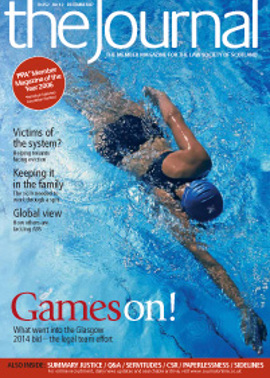Pre-trial priorities

The first article in this series looked at the new system model for the handling of summary cases, and the legislative changes in the Criminal Proceedings etc (Reform) (Scotland) Act 2007 which underpin it. This article considers a selection of the other procedural changes in the Act, changes in sentencing powers, and new provisions in relation to bail.
Undertakings to appear
As has been seen, part of the new system model for the handling of cases involves an increased use of undertakings as a means of bringing cases to court more quickly. At present release on an undertaking to appear can only be granted by the officer in charge of a police station. The Act (s 7) provides that the charging officer, if different, will also have that power.
The legislation also permits the officer who releases an accused on undertaking to attach conditions similar to those on bail orders, and an officer of inspector rank or above can include additional conditions on top of that. Failure to obtemper these conditions will be an offence (s 7). This change, in response to a recommendation by the Sentencing Commission, seeks to put in place a tighter framework for the behaviour of the accused ahead of their case coming to court.
Miscellaneous procedural changes
A number of procedural changes are made to permit changes in the ways in which the summary justice system operates, both now and in the future. Electronic citation of witnesses, and citation of the accused and witnesses by ordinary post, are allowed for (s 8). Non-contentious letter pleas of not guilty, and requests for continuations without plea, will no longer require to be called in court (s 9). And the Act removes the requirement for charges disclosing previous convictions (such as s 103 of the Road Traffic Act, or s 58 of the Civic Government (Scotland) Act) to be dealt with on separate complaints to related charges (s 12).
The power of the court to permit hearings, including trials, in the absence of the accused is extended by s 14. Pre-conviction this must be on the motion of the prosecutor; and the court requires to be satisfied that the accused has been cited or has received intimation of the diet, and that it is in the interests of justice.
The service of certain documents on the accused’s solicitor is permitted, bringing this aspect of summary procedure closer to solemn procedure. It follows that there is an obligation on solicitors to notify the court and the prosecutor when they are engaged – or dismissed – by an accused. In certain circumstances, however, this notification need not be in writing (s 21).
Provision is made in relation to the operation of warrants. It will be competent to re-apprehend an accused under a warrant if s/he absconds, or if there are circumstances which render it impractical to bring the accused to court as required under the current provisions of the 1995 Act. An example of the latter would be where an accused requires hospitalisation after being apprehended (s 33). And in solemn cases the court is given a statutory power to grant a warrant for a failure to appear, effectively replacing the “due course of law” warrant for these purposes. The familiar requirement for an accused who has been apprehended under a warrant to be brought, where practicable, before a court in the course of the next court day is extended to such warrants (s 32).
The court is given a statutory power to make an order on an application by the prosecutor requiring the accused to participate in an identification procedure at any time after the commencement of proceedings. Failure to comply with such an order will be an offence (s 34).
Section 40 gives the court the power to excuse a procedural irregularity. “Procedural irregularity” is given a fairly wide definition, but excusal is by no means automatic – the court has to be satisfied that it is in the interests of justice to excuse it, and that it has arisen due to mistake, oversight, or other excusable reason.
Penalties and powers
One of the features of the summary justice reform programme is the emphasis on the handling of cases at appropriate levels. With that in mind the Act makes a number of changes in relation to sentencing powers.
The maximum term of imprisonment in the summary sheriff court for all common law offences will now be 12 months (s 43); likewise for statutory offences triable either way (s 45). The maximum sentence for certain summary only offences (for example, contravention of the Police (Scotland) Act 1967, s 41) is also increased to 12 months (s 44). The prescribed sum is increased to £10,000 (s 48). These changes will enable a small percentage of cases to be prosecuted summarily instead of under solemn procedure.
The scope of compensation orders is extended. They can now be imposed, in addition, for alarm or distress caused directly to the victim (s 49).
Penalties for what might be described as procedural offences are revised, with the intention of encouraging attendance at court and compliance with bail orders. For the offence of failure to comply with a condition of bail, the maximum sentence of imprisonment is increased to 12 months on summary complaint and five years on indictment (s 3). There is no change to the period by which a sentence for an offence might be increased having regard to the fact that it was committed on bail (the “bail aggravation”); the court must, however, state its reasons for not so increasing where it elects not to do so (s 3).
The maximum sentence for failing to attend under s 150 of the 1995 Act is increased to 12 months (s 15), as is the maximum for failing to attend in answer to an undertaking (s 7). And a separate offence of failure to appear for indictment proceedings is created, attracting a maximum of five years, and bringing solemn and summary procedure into line (s 32).
Although Scottish Ministers will have powers to increase the sentencing powers of the JP court (s 46), no immediate increase in the power of the lay court is provided for in the Act. However, in relation to road traffic law – which is reserved to Westminster – legislation has been enacted giving judges in the district and JP courts the additional power to disqualify from driving other than under the “totting up” procedure.
Bail: a matter for the court
The Act provides a list of factors which might justify the refusal of bail (s 1). This non-exhaustive list reflects established Scottish and ECHR jurisprudence, and is intended to improve transparency and consistency. In addition, it is made clear that the public interest is something to which courts must have regard when determining bail applications (s 1). And it is put beyond doubt that decisions on bail are a matter for the court, notwithstanding the Crown’s position (s 1). Further, where an accused in solemn proceedings for a violent, sexual, or drug trafficking offence has a previous analogous solemn conviction, bail is to be granted only in exceptional circumstances (s 1).
Courts will now be obliged to state reasons for bail decisions and explain bail conditions to the accused (s 2).
A new standard condition of bail is introduced: this stipulates that the accused should not “behave in a manner which causes, or is likely to cause, alarm or distress to witnesses” (s 2).
The grounds on which a review of bail can be sought are clarified (s 4), and the prosecutor is given locus to make submissions on bail post-conviction (s 5).
As readers will recall from the first article, the Act is being commenced in phases. Transitional and savings provisions have been made in the commencement orders. Further details can be found at www.scotland.gov.uk/Topics/Justice/criminal/criminal procedure/19008/PlansForReform
David A Dickson is a procurator fiscal depute on part-time secondment to the Scottish Government
CORRECTION: NOVEMBER REFERANCE
In last month’s article (Journal, November, 13), at the end of the second paragraph after the heading “Efficient conduct of cases” (duty under 1995 Act, s 257 to seek agreement of evidence), the reference “CPRA s 18” should have read “CPRA s 20”.
In this issue
- Discounting justice
- Common sense prevails
- Common sense prevails (1)
- Shaping the future
- Working in a one-stop shop
- Christmas lesson
- Games City
- OFT-related FAQs
- Sea change around the globe
- Covering the money gap
- Pre-trial priorities
- Personal touch
- Keeping money clean
- The lions sleep tonight
- Conversion course
- Family law risk management
- Too well known to challenge
- Temp sheriffs immune after all
- Camels and common sense
- Tough at the TUPE
- Are bloggers fair game?
- "This ain't tiddlywinks, mate"
- Scottish Solicitors' Discipline Tribunal
- Website reviews
- Book reviews
- Defining moment
- Clear view
- Joint conference success






